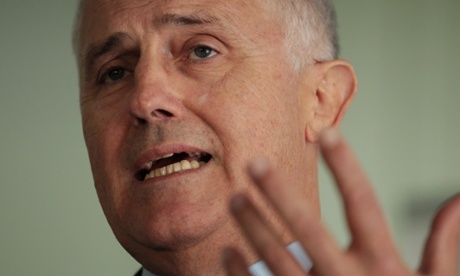
Malcolm Turnbull has expressed regret that Village Roadshow chief executive Graham Burke has declined an invitation to the minister’s forum on illegal downloading because it would be “weighted” towards “crazies” who really just wanted to “steal movies”.
Soon after they released a joint “discussion paper” earlier this month on the controversial issue, the communications minister and the attorney general, George Brandis, expressed very different views on key issues, including who should pay for a crackdown on internet piracy and the role content owners could play by making programs available quickly and affordably.
Turnbull flagged a public forum to allow all the players in the debate to explain their positions.
But on Wednesday, Burke, one of the most vocal of those content providers, said he would not be coming.
“My company is not prepared to participate in the forum. As expressed to you previously, these Q and A style formats are judged by the noise on the night, and given the proposed venue, I believe this will be weighted by the crazies,” he said in the email, first revealed by ZDnet.com.
“What is at stake here is the very future of Australian film production itself and it is too crucially important to Australia’s economy and the fabric of our society to put at risk with what will be a miniscule group whose hidden agenda is theft of movies.”
Turnbull said he would “obviously rather that Graham was there, but it is up to him”.
Appearing at the 9 September forum will be writer and producer Peter Duncan, known for his work on the ABC series Rake, iiNet chief executive David Buckingham, Telstra executive director Jane Van Beelen, Foxtel chief executive Richard Freudenstein, Apra chief executive Brett Cottle and the head of the Choice consumer group, Alan Kirkland.
The most contentious questions in the discussion paper are what sanctions should be applied to repeat illegal downloaders, what role should be taken by the internet service providers and what role by the content owners, and who should pay for a sanctions regime.
Soon after its release, Turnbull said he believed the content owners should consider taking legal action against illegal downloaders, and should also bear at least some of the cost of a sanctions system.
“I think it is reasonable to ask ISPs to alert people, so long as their costs are covered, and those notices will have an educative effect, but in terms of a sanction, that obviously should lie with the content owner,” he told Guardian Australia. “That is a reasonable approach, because they are suffering the loss.
“There are some people in the content industry who believe the costs should be borne in whole or in part by the telecommunications industry. I don’t find that a persuasive argument.”
Burke rejected that idea, and said ISPs should be required to slow down the internet speeds of repeat offenders.
The email rejecting the invitation to the forum was sent to Turnbull and nine other chief executives who had been invited to the event.
In a recent blog on the issue Turnbull explained the difficulties with Burke’s plan for ISPs to slow down internet speeds for repeal illegal downloaders.
“The ISPs would … point out many practical issues – cutting off or slowing down someone’s account will certainly mean they won’t be as whippy at file sharing as they used to be, but it may also mean they won’t be able to put their kids’ pictures on Facebook, work from home, take a university course online, let alone videoconference with a doctor. Given the central importance of connectivity to all of our lives, cutting off or degrading an internet connection is a big deal – which of course is why the content owners believe it would be such an effective sanction and disincentive to infringing copyright. And then what about family or workplace accounts where one person is doing the wrong thing and others are not?,” he wrote.
“The content owners have said they simply do not want to sue individuals. As Village Roadshow’s Graham Burke said in this SMH article recently. It costs money and results in bad publicity for the copyright owners. To which of course the ISPs respond ‘And you think throttling back our customers’ internet access won’t be bad publicity for us?’”
And he again linked the issue of illegal downloading to the business decisions of the content owners.
“As we note in the discussion paper and as I have said elsewhere, a part of the solution is making content available in Australia at the same time, or very shortly after, it is released overseas and at a comparable price.
“The owners of copyright material, music, movies or whatever, are able to determine the price at which they sell it and when they sell it. That’s their call.
“But their decision as to availability and pricing will have consequences both in terms of incentivising copyright infringement and, very importantly, in the level of public support for stronger measures to stop or discourage piracy.”
Burke was unavailable for comment.

